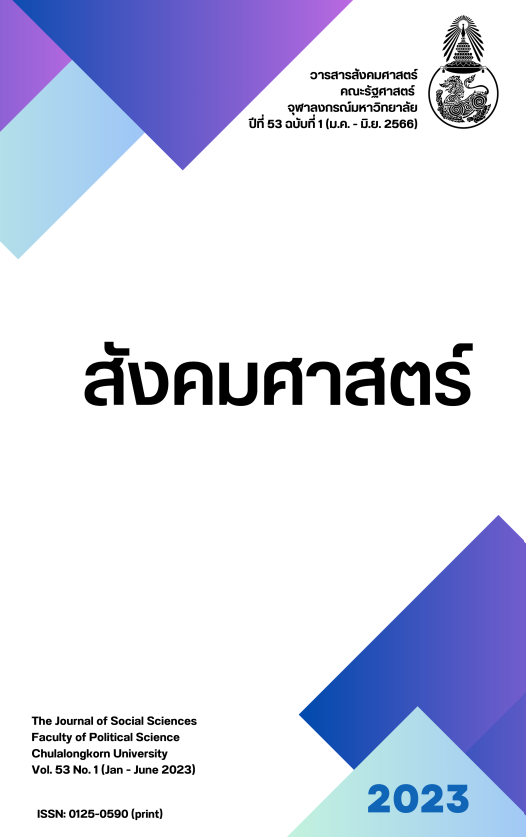เศรษฐกิจพอเพียงกรอบคิดการพัฒนาชุมชนชาติพันธุ์ของรัฐไทย: ศึกษาความเปลี่ยนแปลง วิถีชีวิต กิจกรรมทางเศรษฐกิจ บริบททางสังคมและชุมชนของชนเผ่าในบริเวณศูนย์พัฒนาโครงการหลวงหนองหอย จังหวัดเชียงใหม่
DOI:
https://doi.org/10.61462/cujss.v53i1.1292คำสำคัญ:
เศรษฐกิจพอเพียง, การพัฒนา, ชาติพันธุ์, โครงการหลวงบทคัดย่อ
บทความวิจัยฉบับนี้สะท้อนให้เห็นความซับซ้อนด้านอุดมการณ์ของรัฐผ่านวาทกรรมการพัฒนาพื้นที่ห่างไกล พื้นที่ชายขอบ และกลุ่มชาติพันธุ์ ว่าท้ายสุดแล้วประเด็นเรื่องการนำปรัชญาเศรษฐกิจพอเพียงมาเป็นแนวทางพัฒนานั้นมีความเป็นไปได้มากเพียงใดและความสัมพันธ์ระหว่างโครงการหลวงหนองหอยกับชุมชนชาติพันธุ์มีทิศทางการพัฒนาและการตอบสนองอย่างไร จึงนำไปสู่วัตุประสงค์กล่าวคือ เพื่อศึกษาความเปลี่ยนแปลง วิถีชีวิต กิจกรรมทางเศรษฐกิจ บริบททางสังคมและชุมชนของชนเผ่าในบริเวณศูนย์พัฒนาโครงการหลวงหนองหอย จังหวัดเชียงใหม่บนกรอบคิดการพัฒนาชุมชนชาติพันธุ์ของรัฐไทยภายใต้แนวทางเศรษฐกิจพอเพียง การศึกษาดังกล่าวเลือกนำเสนอข้อมูลที่ได้จากการวิจัยเชิงคุณภาพซึ่งมีกลุ่มผู้ให้ข้อมูลทั้งภาครัฐและภาคประชาชนที่เกี่ยวข้อง ข้อค้นพบในงานวิจัย คือ หน่วยงานภาครัฐและนโยบายรัฐส่วนกลางก่อให้เกิดความเปลี่ยนแปลงทางด้านสังคม วัฒนธรรม วิถีชีวิต และระบบเศรษฐกิจ อย่างมากต่อชาติพันธุ์ซึ่งความเปลี่ยนแปลงที่เกิดขึ้นไม่ได้เป็นลักษณะของการคุกคามและบังคับแต่เป็น “การเกื้อหนุนกัน” ซึ่งกันและกันระหว่างโครงการหลวงในฐานะหน่วยงานของรัฐในการนำนโยบายจากรัฐเข้าสู่พื้นที่ชายขอบที่ห่างไกลอำนาจรัฐผ่านวาทกรรมการพัฒนา
Downloads
เอกสารอ้างอิง
Amara Phongsapitch. 2016. “Royal Project: The Joint Between the State and Civil Society.” Journal of Social Research 39(2), 1-34.
Anurat Wichiankeaw. 2010. “Royal Project, Cultural Tourism in Highlands”. National Research Council of Thailand (NRCT) and Chiang Mai Rajabhat University.
Aphisit Puengporn and Kannika Sajakul. 2021. “The Development of the Transition Process towards Sustainable Development of Karen Communities in Highlands.” Journal of Education Studies 49(1), 1-18.
Atchara Rakyutitham. (2013). Highlands amid the Contention of Meaning of Animal Husbandry Corn and the Identity of Highland Farmers. Journal of Social Sciences, 25(1), 19-52.
Chaianan Samutawanit. 1999. The New Theory: A Great Dimension of Thought in the Documentation for the Seminar on the Philosopher for the Land Project: A New Theory under the Royal Initiatives. Nonthaburi: Civil Service Training Institute.
Chirapat Mahawong, Witthaya Chansila and Thamrongrak U-nakarin. 2016. The Development of Academic Cooperation Network Management Model of Schools in Remote Areas on Highlands. Journal of Education Naresuan University 18(4), 114-27
Charin Mangkhang, Patchanee Junsiri, Pimpa Nuansawan, Mukdawan Sangsuk and Patcharaporn Anukul. 2017. “Knowledge Management for Sustainable Highland Development of Teachers in the Hill Tribe Community Learning Center, Chiang Mai Province.” Journal of Human Sciences 19(1), 208-39.
Fundamentals of Royal Agricultural Stations and 39 Royal Project Development Centers. (n.d.). Accessed October 5, 2021. https://rpf.or.th/shared/Data39Devcenter.pdf.
Jeeraphan Kanchanachitra. 1980. Community Development. Bangkok: Ramkhamhaeng University.
Ministry of Social Development and Human Security. 2006. Social Development System Leading to Human Security. Bangkok: Thepphenwanis.
Nantanee Kamolsiripichaiphon. 2006. Sustainable Development. Chanthaburi: Faculty of Humanities and Social Sciences, Rambhai Barni Rajabhat University.
Nuttawut Subuppatham. 2015. Theories and Principles of Community Development. Faculty of Humanities and Social Sciences, Rambhai Barni Rajabhat University.
Panadda Manit. 2008. “The Changes in the Way of Life of Community and Environment, Implementations According to the Royally Initiated Demonstration Station of Agriculture, Forestry and Environment: A Case Study of Ban Pak Mae, Piang Luang Sub-district, Wiang Haeng District, Chiang Mai Province.” Master’ thesis, Education, Chiang Mai University.
Panuwut Buranaphrom and Narinchai Pattanapongsa. 2016. “Factors Affecting Prevention of Forest Destruction in Nan Province.” Research and Development Journal, Valaya Alongkorn under the Royal Patronage 11(1), 231-40.
Patcharee Klommueang. 2019. “Marginalized People: Thais of Malay Descent in the Three Southern Border Provinces.” Academic Journal of Bangkok Thonburi University 8(2): 1-10.
Pattaramon Suwaphan and Suthy Prasartset. 2020. “Political Economy on the Process of Ultraism and Reactions to the State Power and Capitals of Karen Ethnic Groups.” Burapha Journal of Political Economy 8(2), 48-78.
Pinkaew Luengaramsri. 2003. Marginal Ethnicity in Chiang Rai Province. Bangkok: The Princess Maha Chakri Sirindhorn Anthropology Centre, The Thailand Research Fund.
Pisit Pongsaporamut. 2018. “Strong Community Development from Knowledge Management of the Royal Project Foundation.” Political Science Review Journal, Kasetsart University 5(1), 112-25.
Royal Project Foundation. 2012. “The History of the Royal Project Foundation.”, Accessed June 15, 2019. http://www.royalproject
thailand.com/about
Ruangaroon Norkham, Sasina Khunthongwong and Panittra Boonsong. 2019. “Guidelines for the Development of Coexistence between Communities and Forests in Conservative Forest Areas.” Udon Thani Rajabhat University Academic Journal 7(2), 1-20.
Sirirung Srisitthiphisarnpop. 2021. “Ethnic-State-Forest Crisis" through the Case of "Bang Kloi" in the Viewpoint of "Anand Kanchanaphan".” Accessed October 30, 2021. https://greennews.agency/?p=22848.
Somsak Srisantisuk. 2007. “Assessment and Synthesis of the Knowledge State of Cultural Research. Northeastern Region: Ethnic Diversity.” Journal of Language and Culture 26(1-2), 35-47.
Soonthorn Kulwattanaworapong. 2001. Following the Royal Initiatives of Sufficiency Economy. Bangkok: Kids Club.
Sumet Tantivejkul. 2001. Sufficiency Economy following the Royal Initiatives under the King's Footsteps. Bangkok: Matichon.
Sunitta Choosawad. 2010. “Sakai: The Creation of Alternatives in the Development Context of the Thai State.” Master thesis, Arts, Prince of Songkla University.
Supachai Charoenwong. 2001. Decoding the Development. Bangkok: October Printing.
Teera Nuchpiam. 2018. Unit 1, Theoretical Concepts of Human Development. Documentation for Teaching in the Human Development Course in a Global Context. Nonthaburi: Sukhothai Thammathirat Open University.
Wasan Paunpunwong. 2017. “The Development of Rural Areas to Become Cities. A Case Study of Doi Mon Cham Tourist Attractions, Mae Rim District, Chiang Mai Province.” Journal of Political Science and Public Administration, Chiang Mai University 8(2), 55-80.
Watinee Khumsaeng. 2010. “The Traditions of the Hmong People: A Case Study of Communities in Nong Hoi Royal Project Development Center.” Accessed June 18, 2019. http://www.research.cmru.ac.th/research59
/ris/download.php?download_file=article&no=12.
Wirunsiri Jaima and Praphaphan Chaiyanon. 2017. “The Participatory Management Model According to the Sufficiency Economy Philosophy of the Chrysanthemum Flower Farmers Group of the Sa-Ngo Royal Project Development Center, Chiang Rai Province.” Journal of Management Sciences, Chiang Rai Rajabhat University 12(1), 91-116.
Worawit Noppakaew. 2018. “Political Ecology on Cultural Space Management “Rotational Farming”: Problems and Conflicts between the State and Communities.” Academic Journal of the Faculty of Humanities and Social Sciences, Nakhon Sawan Rajabhat University 5(1), 367-406.
ดาวน์โหลด
เผยแพร่แล้ว
รูปแบบการอ้างอิง
ฉบับ
ประเภทบทความ
สัญญาอนุญาต
ลิขสิทธิ์ (c) 2023 ณะรัฐศาสตร์ จุฬาลงกรณ์มหาวิทยาลัย

อนุญาตภายใต้เงื่อนไข Creative Commons Attribution-NonCommercial-NoDerivatives 4.0 International License.
เงื่อนไขการอนุญาตสาธารณะ
นโยบายลิขสิทธิ์และการอนุญาต
วารสารสังคมศาสตร์ จุฬาลงกรณ์มหาวิทยาลัย เผยแพร่เนื้อหาทั้งหมดภายใต้ สัญญาอนุญาตครีเอทีฟคอมมอนส์แบบแสดงที่มา-ไม่ใช้เพื่อการค้า-ไม่ดัดแปลง 4.0 นานาชาติ (CC BY-NC-ND 4.0)
ลิขสิทธิ์
บทความทั้งหมดที่ตีพิมพ์ในวารสารสังคมศาสตร์ จุฬาลงกรณ์มหาวิทยาลัย เป็นลิขสิทธิ์ของ คณะรัฐศาสตร์ จุฬาลงกรณ์มหาวิทยาลัย ผู้เขียนจะโอนสิทธิ์ทั้งหมดให้แก่วารสารเมื่อบทความได้รับการตอบรับให้ตีพิมพ์
สัญญาอนุญาต CC BY-NC-ND 4.0
ภายใต้สัญญาอนุญาตนี้:
-
แสดงที่มา (BY): ผู้ใช้ต้องแสดงที่มาโดยอ้างอิงถึงผู้เขียน คณะรัฐศาสตร์ จุฬาลงกรณ์มหาวิทยาลัย และวารสารสังคมศาสตร์ จุฬาลงกรณ์มหาวิทยาลัย พร้อมทั้งให้ลิงก์ไปยังสัญญาอนุญาต และระบุหากมีการเปลี่ยนแปลง ทั้งนี้สามารถทำได้ในลักษณะที่สมเหตุสมผล แต่ต้องไม่ทำในลักษณะที่แสดงว่าผู้อนุญาตให้การรับรองผู้ใช้หรือการใช้งานดังกล่าว
-
ไม่ใช้เพื่อการค้า (NC): ผู้ใช้ไม่สามารถใช้เนื้อหาเพื่อวัตถุประสงค์ทางการค้า การใช้งานเชิงพาณิชย์จะต้องได้รับอนุญาตเป็นลายลักษณ์อักษรล่วงหน้าจากผู้เขียนและคณะรัฐศาสตร์ จุฬาลงกรณ์มหาวิทยาลัย
-
ไม่ดัดแปลง (ND): หากผู้ใช้นำเนื้อหาไปรวม ดัดแปลง หรือต่อยอด ผู้ใช้ไม่สามารถเผยแพร่งานที่ดัดแปลงนั้นได้ การดัดแปลงผลงานจะต้องได้รับอนุญาตเป็นลายลักษณ์อักษรล่วงหน้าจากผู้เขียนและคณะรัฐศาสตร์ จุฬาลงกรณ์มหาวิทยาลัย
นโยบายการเข้าถึงแบบเปิด
วารสารสังคมศาสตร์ จุฬาลงกรณ์มหาวิทยาลัย ให้การเข้าถึงเนื้อหาแบบเปิดโดยทันทีตามหลักการที่ว่าการทำให้งานวิจัยสามารถเข้าถึงได้อย่างเสรีแก่สาธารณะจะสนับสนุนการแลกเปลี่ยนความรู้ในระดับโลก ผู้ใช้สามารถอ่าน ดาวน์โหลด คัดลอก เผยแพร่ พิมพ์ ค้นหา หรือเชื่อมโยงไปยังเนื้อหาฉบับเต็มของบทความได้โดยไม่ต้องขออนุญาตล่วงหน้าจากผู้จัดพิมพ์หรือผู้เขียน ทั้งนี้เป็นไปตามสัญญาอนุญาต CC BY-NC-ND 4.0
นโยบายการเก็บบันทึกด้วยตนเอง
ผู้เขียนสามารถเก็บบันทึกบทความฉบับตีพิมพ์สุดท้าย ต้นฉบับที่ส่ง (preprint) หรือฉบับที่ผ่านการประเมิน (postprint) ในคลังสถาบันหรือเว็บไซต์ส่วนตัวได้ โดยต้องมีการอ้างอิงการตีพิมพ์ครั้งแรกในวารสารสังคมศาสตร์ จุฬาลงกรณ์มหาวิทยาลัย พร้อมระบุแหล่งอ้างอิงที่สมบูรณ์และลิงก์ไปยังเว็บไซต์ของวารสาร
การขออนุญาต
สำหรับการใช้งานนอกเหนือจากที่ครอบคลุมโดยสัญญาอนุญาต CC BY-NC-ND 4.0 กรุณาติดต่อ:
กองบรรณาธิการ
วารสารสังคมศาสตร์ จุฬาลงกรณ์มหาวิทยาลัย
คณะรัฐศาสตร์ จุฬาลงกรณ์มหาวิทยาลัย
Email: cusocscij@gmail.com
สำหรับข้อมูลเพิ่มเติมเกี่ยวกับสัญญาอนุญาตครีเอทีฟคอมมอนส์แบบแสดงที่มา-ไม่ใช้เพื่อการค้า-ไม่ดัดแปลง 4.0 นานาชาติ กรุณาเยี่ยมชม: https://creativecommons.org/licenses/by-nc-nd/4.0/deed.th





